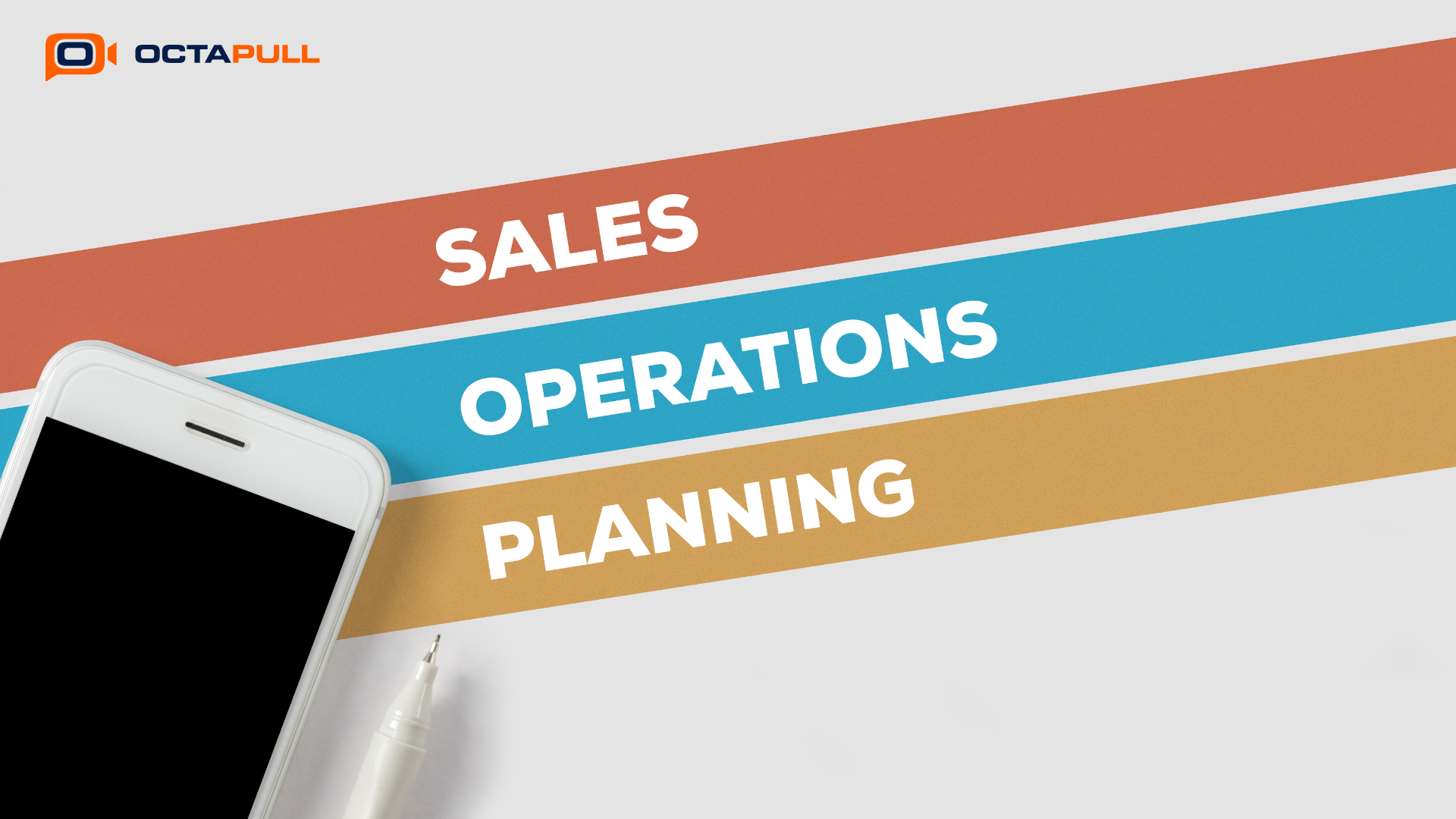Sales Planning in E-Commerce: How to Stand Out in the Digital World
In today's digital world, consumers' interest in online shopping platforms continues to grow, making e-commerce increasingly important for businesses aiming to boost their sales.
Developing effective sales planning is crucial for attracting customers, converting potential consumers into loyal ones, increasing revenue, and achieving success in e-commerce.
Sales planning requires various strategies and digital tools that enable businesses to set and achieve their sales goals, track performance, and make data-driven decisions and optimizations.
As e-commerce revolutionizes traditional shopping experiences, businesses must adopt innovative approaches to reach and retain customers.
In this sense, leveraging advanced tools such as automation solutions such as Octapull SFA, CRM systems, and analytics platforms allows businesses to manage their operations effectively. On the other hand, collaboration tools such as OctaMeet support sales teams by enhancing their efficiency and productivity.
What is Sales Planning?
Sales planning is an integral part of sales processes, including B2B, B2C, and e-commerce, and allows businesses to determine whether they can achieve the goals they set in a specific period or not.
Aside from planning, it involves tracking and evaluating sales performance and identifying areas that may need improvement or adjustments.
With these insights, businesses are effectively able to manage and control their sales strategies by setting competitive and achievable targets and working against them. In this sense, effective sales planning strategies are essential for future success.
The main strategies for sales planning include:
- Identifying target audience and implementing business plans accordingly.
- Anticipating potential setbacks and obstacles, preventing or minimizing their negative outcomes.
- Adjusting sales strategies depending on the latest changes and trends in the market.
What is the Importance of Sales Planning in E-Commerce?
E-commerce is defined as the business of buying and selling goods and services, often through marketplaces, via the Internet. It is also a sales strategy preferred by businesses that use/utilize B2B (business-to-business) and B2C (business-to-customer) models.
E-commerce trends continue to change traditional shopping experiences. Customers now have increased flexibility and opportunity to make purchases from various digital devices, including smartphones, tablets, personal computers, and other mobile and smart devices.
Due to its ever-increasing prevalence, businesses that sell their products and services over the Internet must adopt proper sales planning practices.
These practices enable them to reach out to more customer groups, gain and maintain competitive advantage over rivals, and increase their revenue and chances of success in their respective markets and sectors.
Effective Steps for Sales Planning in E-Commerce
Market Analysis and Customer Segmentation
Sales planning enables businesses to analyze the latest market trends and competitor strategies. Additionally, segmentation, it offers valuable insights into customer purchase behavior, helping businesses understand and target specific customer groups more effectively.
Positioning of Products and Pricing Strategies
Through effective sales planning, businesses can determine the best pricing strategies for the market and attract customers while maintaining their profits. By strategically positioning their products and services, they can set their priorities to focus on and manage their inventory efficiently.
Promotion and Campaign Management
Businesses can create suitable marketing campaigns in line with their online sales platforms, including social media, email marketing, inbound or content marketing, paid advertising, SEO, and SEM.
Remote Team Coordination
With the increasing prevalence of remote working, team members are often located in different cities, regions, and even countries. Therefore, the use of collaboration tools and video conferencing software such as OctaMeet increases coordination and teamwork between remote teams, enhancing their efficiency and productivity.
Business Tools and Software
Businesses can use various tools to manage their campaigns, track sales, regularly monitor their overall performance, and make data-driven decisions. These include automation solutions such as Octapull SFA, CRM for tracking customer data and feedback, and data analytics tools.
How to Become More Competitive in the Digital World: Effective Strategies
Offering Personalization
Personalization in e-commerce is a common marketing technique that aims to tailor the online shopping experience on an individual level.
Offering product recommendations, relevant content, personalized offers, and campaigns based on their preferences and needs can greatly improve customer experience and increase satisfaction.
By strengthening the relationships with customers and enhancing interaction, businesses can increase their conversion rates and loyalty. Therefore, personalization is a crucial step in sales planning in online sales for repeat sales.
By segmenting consumers into groups, businesses can better tailor their offerings. This process involves collecting customer data through various channels such as questionnaires, surveys, and feedback forms, and analysis of that data through automation software, artificial intelligence (AI), and analytic tools.
Social media platforms are commonly used to collect data regarding customer interaction and behavior due to high interaction possibilities. Remarketing can also be used to attract existing customers.
Some of the personalization techniques include:
- Product-Detail Page (PDP): Showing similar or related product recommendations can increase sales and convert rales. Cross-selling is a good example of this.
- Continuous Shopping Banners: Special recommendations can be shown to returning customers based on their previous sessions so that they can easily find products they might be interested in.
- Personalized Lists: Businesses can create shopping lists based on locations or different criteria such as reviews to provide unique and relevant products to customers.
Creating High-Quality Content
Investing in high-quality content is crucial for attracting and retaining customers. Through user-generated content (UGC), businesses can announce their products and services, educate customers, and encourage them to make purchases through authentic content.
Effective content strategies include:
- Social Media: Utilizing platforms to share engaging content and interact with customers.
- Influencer Collaboration: Forming partnerships with influencers to reach broader audiences and build credibility.
- Informative Blog Content: Creating educational blog posts that address customer needs and interests.
Customer reviews and testimonials are particularly beneficial, as consumers highly value other people’s opinions and reviews, and including such content can contribute to a higher customer experience.
Implementing inbound marketing strategies, paid advertising, SEO, and SEM can drive organic traffic to your website. A user-friendly website, combined with keyword analysis and optimization, helps businesses reach wider audiences and establish trust and credibility.
Incorporating appropriate content strategies into sales planning, determined by business needs and customer expectations, allows businesses to convert potential consumers into loyal customers and increase sales in e-commerce.
Performance Evaluation
Regular performance evaluation is vital to the success of sales planning efforts and continuous improvement. These are often achieved through the analysis of metrics such as KPIs (Key Performance Indicators) determined by business goals and preferred e-commerce models.
By evaluating metrics including conversion rates, order value, acquisition costs, retention, and shopping cart abandonment rates, businesses can identify points that can be optimized to increase sales and attract more customers to a sales funnel.
Encouraging customers to leave feedback and analyzing this feedback data provide insights into improving customer experience and identifying areas for product improvement.
Setting clear goals and measuring progress against targets ensures that business strategies align with overall objectives. To streamline processes and manage sales operations, businesses should implement technological tools, including CRM systems and automation solutions such as Octapull SFA.
Utilizing these tools facilitates monitoring sales data and campaign efficiency, helping businesses gain a competitive advantage and increase profits.
Additionally, performance evaluation strategies enable businesses to stay agile and adapt to rapidly changing market conditions and trends.
Improving Customer Experience on E-Commerce Platforms
Loyalty Programs
Loyalty programs are one of the most common practices in e-commerce, especially for retailers and enterprises. They aim to attract new customers and retain existing ones by offering various incentives such as discounts, rewards, special campaigns, and gift cards.
Designed to encourage and increase repeat sales, loyalty programs also contribute to enhancing brand awareness and improving brand image. By forming and maintaining close bonds with customers, businesses can significantly increase loyalty, resulting in higher sales and revenue.
Businesses can create personalized campaigns and offer chosen services and goods for free or at discounted prices. Earned points and gift cards can be used in other different platforms and businesses. The use of mobile apps can also be encouraged by offering rewards.
CRM tools are important in this process as they can collect and provide valuable customer data such as personal information and sales statistics.
Additionally, business intelligence (BI) and data analytics can be utilized to analyze reports related to such data and facilitate an understanding of customer purchase behavior.
SFA solutions enable businesses to fulfill customer needs and expectations and offer a better customer experience by implementing loyalty programs.
Offering Omnichannel Experience
Omnichannel sales strategies in e-commerce refer to the creation of a unified customer experience through the integration of sales channels, aiding businesses in reaching their goals in digital marketplaces.
In this way, businesses can adopt a consistent and seamless approach to selling their products and services, regardless of platforms used by customers, such as online shops, physical stores, or mobile shopping apps.
Many customers appreciate and prefer the opportunity to shop from brands that offer viewing products on online marketplaces, delivery-to-address, and pick-up from store options.
For this reason, embracing customer-friendly approaches in sales planning enables businesses to fulfill requests and expectations, thereby increasing customer satisfaction and loyalty.
In this sense, SFA tools such as Octapull SFA provide an ideal platform to improve sales planning, monitor sales on different channels and platforms, track deliveries, and manage marketing campaigns.
With CRM integration, customer data can be shared across all channels, allowing for better customer support and consistent customer experience (CX).
Evaluating and Implementing Customer Feedback
Implementing feedback offers various advantages, such as improving the quality of products and services, building customer networks, reaching out to wider masses, and keeping regular customers.
By collecting data regarding sales statistics and customer experience (CX), businesses can analyze and evaluate that data in terms of relevance, applicable insights, and the latest sales trends in the market.
Multiple sources can be used to collect feedback, including online surveys, email questionnaires, and forms on mobile applications and company websites.
Furthermore, it is a good practice to monitor the social media accounts of enterprises, which provides insights into statistics of user interaction such as comments, reviews, and reactions.
Collected customer information can be divided into different segments such as location, region, country, age, needs, and interests. This analysis enables businesses to better understand consumer expectations and purchase behavior.
Business Intelligence (BI) tools and business software such as SFA and CRM along with data analytics provide valuable insights for improving products and services, and developing marketing campaigns that attract attention.
Hence, embracing customer-oriented approaches and sales planning strategies according to collected feedback can increase customer satisfaction and loyalty, which leads to repeat sales and brand visibility.
Support Your Sales Planning Processes with OCTAPULL
Sales planning in e-commerce requires the use of the right business software and remote sales team integration to offer better customer experience, increase sales, and achieve organizational success.
OCTAPULL’s innovative automation solution Octapull SFA and video conferencing software OctaMeet supports businesses in providing easy-to-use platforms for coordination and reaching their sales goals.
Manage Sales and Campaigns Effectively with Octapull SFA
Octapull SFA is a robust automation platform for streamlining sales processes, creating and managing sales planning, sales forecasting, tracking deliveries, performance tracking of enterprises, and monitoring sales on different channels.
Integration with CRM and data analytics tools allows for easier customer data management across platforms and effective analysis of such data for enhanced segmentation and personalized customer experience.
Octapull SFA offers seamless integration with OctaMeet and enables sales teams to effortlessly hold online meetings and benefit from increased efficiency and productivity.
Increase Your Sales Team Efficiency with OctaMeet
OctaMeet offers businesses a secure and robust solution for their video conferencing needs and facilitates corporate communications. It provides businesses with high-quality video and voice call capabilities along with advanced sharing tools such as whiteboard and annotations.
In this way, teams can share documents, screens, meeting notes, and presentations. With its features, OctaMeet allows for easier planning of online individual and group meetings, webinars, and workshops, providing an ideal platform to support sales teams in their e-commerce operations.
With built-in recording and cloud storage, OctaMeet eliminates the need for external software. In-app messaging and file sharing allow for task tracking and monitoring workflow.
OctaMeet offers free and unlimited one-on-one video calls. If you would like to learn more about its advantages and licenses, you can schedule a demo meeting with our product team.
You can use OctaMeet free for 30 days. Sign up today!






